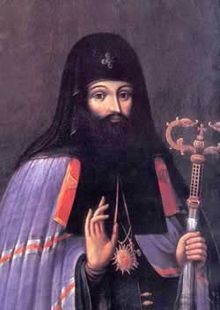Peter Mogila
Peter Mogila | |
|---|---|
 | |
| Title | Metropolitan of Kyiv and Halych and All Rus', Exarch of Ecumenical Patriarchate of Constantinople |
| Personal | |
| Born | December 21, 1596 |
| Died | January 1, 1647 (aged 50) |
| Resting place | Dormition Church (Kyiv Cave Monastery) |
| Religion | Christianity |
| Senior posting | |
| Period in office | 1633-1646 |
| Consecration | 7 May 1633 in Dormition Church, Lviv |
| Predecessor | Isaia Kopynsky |
| Successor | Sylvester Kosiv |
| Previous post | Archimandrite of the Kyiv Pechersk Lavra |
Petro Mohyla or Petro Mogila (Ukrainian: Петро Могила; 21 (31) December 1596,[1] - 1 (11) January 1647[1]) was a Ukrainian political, church and educational figure.[2] He was a Metropolitan of Kyiv, Halych, and All Rus' (1633-1647). He was a representative of the Moldavian noble family Mohyla (in Romanian Movilă). He was born in Suceava, Romania. He is a son of the Moldavian pricne Simion Mohyla (Movilă).
He took part in the political life of the Polish–Lithuanian Commonwealth. He participated in the Khotyn War (1620-1621). He carried out a radical reform of the Orthodox Church and education in Ukraine according to Catholic and Greek Catholic models. He is the founder of Ukrainian theology.[3] He is the author of "Trebnik" (1646),[4] co-author of the catechism "Orthodox Confession of Faith" (1640). He died in Kyiv in 1647 and was buried in Kyiv-Pechersk Lavra. He is a local saint as he was recognized as saint by the Ukrainian Orthodox Church (Moscow Patriarchate) and the Ukrainian Orthodox Church of the Kyiv Patriarchate in 1996.
References[change | change source]
- ↑ 1.0 1.1 "Освітня реформа. Св. Петро Могила". 2018-09-18. Archived from the original on 2018-09-18. Retrieved 2021-01-22.
- ↑ Kollmann, Nancy Shields (2016-12-22). The Russian Empire 1450-1801. Oxford University Press. ISBN 978-0-19-108269-6.
- ↑ "Creeds of Christendom, with a History and Critical notes. Volume I. The History of Creeds. - Christian Classics Ethereal Library". 2016-09-11. Archived from the original on 2016-09-11. Retrieved 2021-01-22.
- ↑ "Енциклопедія історії України". 2016-07-21. Archived from the original on 2016-07-21. Retrieved 2021-01-22.
